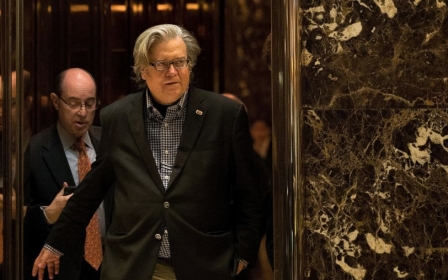Obama’s rush to fix refugee pledges before January

UNITED NATIONS – Members of US President Barack Obama’s administration are scrambling to cement gains they made in tackling the global refugee crisis at a summit earlier this year before the team vacates the Oval Office in January.
Catherine Wiesner, the US Department of State’s deputy assistant secretary on refugees, told Middle East Eye that colleagues were working to ensure that donor countries come good on their pledges to resettle refugees and boost aid for those displaced by war and disasters.
They seek to confirm exactly what the 52 countries and world organisations that attended Obama’s Leaders’ Summit on Refugees in September offered. They also aim to publish a list of international pledges in the coming weeks to answer criticisms of opaqueness.
The US is seeking another country to “take over responsibility” on refugees by hosting a follow-up meeting on the sidelines of the UN General Assembly (UNGA) in 2017 to keep track of the “progress and the commitments” made in September, Wiesner told MEE.
“We’ll also be looking with whoever steps forward to be the co-host and … planning with them some regional or thematic meetings over the course of the year to keep the momentum going,” she added.
Global refugee crisis
Obama hosted the refugee summit on the sidelines of UNGA as an ad hoc response to a global refugee crisis of some 65.3 million displaced people after UN members rejected a global plan to commit to resettle 10 percent of refugees each year.
The largest mass displacement crisis since the Second World War has seen refugees pour into Europe from parts of Africa, Asia and the Middle East, giving succour to populist, anti-immigrant politicians in the West, including US President-elect Donald Trump.
Trump’s campaign rhetoric suggests he will be unwilling to accommodate refugees from Islamist countries in the US after he takes office in January – and less likely than Obama to push other countries to share the burden.
At Obama’s UN summit, countries agreed to boost spending on refugees by $4.5bn from the 2015 levels, to eventually double the number of resettlement slots to about 360,000 and to make it easier for refugees to work and study in host countries.
After pledging conferences, organisers typically publish lists of donors and their commitments in the media. Since the September summit, however, US officials have kept tight-lipped about the pledges made behind closed doors.
Mark Yarnell, an advocate at Refugees International, a pressure group, urged the US State Department to release details speedily to help activists and aid workers in donor countries keep tabs on their governments.
“First you need that basic information of the full commitments and then you need to dig into what each country pledged exactly. Is it actually a new commitment? Is it money that was previously committed and then re-purposed?” Yarnell told MEE.
According to Wiesner, the “list will be published”. She put delays down to “sensitivity” among donors over absorbing refugees and opening up job and schooling opportunities that could be perceived as detrimental to native populations.
The list is expected to reveal sharp increases in resettlement slots in some middle-income countries, as well as new visa opportunities for workers and their families from war-torn Arab countries to live in the oil-rich Gulf, Wiesner said.
“In the Gulf, a lot of these countries have Syrians and other nationalities that have come to their country to work … so a lot of the dialogue there is about alternative pathways,” Wiesner said. “Whether people are already working in Gulf countries and have their status regularised, or are able to bring their families in safe ways to join them.”
A co-host from the September meeting is expected to take responsibility for a follow-up meeting during the UNGA in 2017 to track pledges, but, so far, neither Canada, Ethiopia, Germany, Jordan, Mexico nor Sweden has stepped up to the plate.
Praise for refugee donor countries
Matthew Saltmarsh, a spokesperson for the UN refugee agency, UNHCR, praised countries for making “significant and tangible commitments to support refugees” via aid, new admissions, strengthening asylum systems and offering other legal protections.
“We understand that the specifics of a review process and follow-up to the summit are being discussed among the co-hosts and other participating states. UNHCR looks forward to supporting states as they begin the important work of implementation,” Saltmarsh told MEE.
According to Saltmarsh, UN members are also working towards a global deal to “address refugee situations more comprehensively, predictably and equitably” at some point in 2018.
Karen Abuzayd, who led UN efforts on refugees during the meetings in September, said the UNHCR aimed to significantly increase the number of safe havens for displaced people worldwide by resettling five percent of global refugees each year.
That would amount to 1.1 million resettlements in 2017, compared to 100,000 in 2015.
“I think UNHCR’s going to push it, so, and the governments have agreed to it, so they’ll have to step up,” Abuzayd told MEE. “And if they do 5 percent, I’ll be really pleased next year.”
Middle East Eye propose une couverture et une analyse indépendantes et incomparables du Moyen-Orient, de l’Afrique du Nord et d’autres régions du monde. Pour en savoir plus sur la reprise de ce contenu et les frais qui s’appliquent, veuillez remplir ce formulaire [en anglais]. Pour en savoir plus sur MEE, cliquez ici [en anglais].




